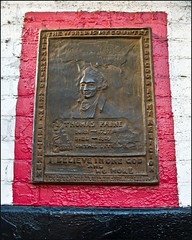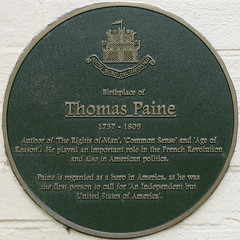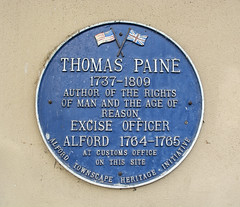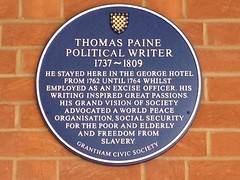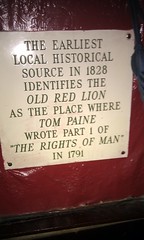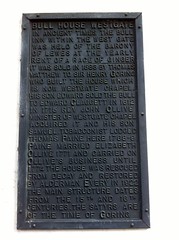Thomas Paine


Thomas Paine
(1737-1809)
Commemorated on 13 plaques
Thomas Paine B.1737; D.1809. Author of "Common Sense", "Rights of Man", and "The Age of Reason", A founder of American independence with pen and sword. Lived in this house as exciseman and tobacconist. 1768-1774.
Bull House, 92 High St, Lewes, United Kingdom where they lived (1768-1774)
Thomas Paine 1737-1809 here expounded his revolutionary politics. This inn is regarded as a cradle of American independence which he helped to found with pen and sword.
High Street, Lewes, United Kingdom where they expounded
"Common Sense". At his print shop here, Robert Bell published the first edition of Thomas Paine's revolutionary pamphlet in January 1776. Arguing for a republican form of government under a written constitution, it played a key role in rallying American support for independence.
South 3rd Street, Philadelphia, PA, United States where they was published
United States of America British Isles France Thomas Paine born 1737 died 1809 on this site. I believe in one God and no more. All mankind are my bretheren. The world is my country. To do good is my religion
59 Grove Street, Greenwich Village, New York, NY, United States where they died (1809)
Thomas Paine 1737-1809 Anglais de naissance Américain d'adoption Français par décret a vécu dans cet immeuble de 1797 à 1802. Il mit sa passion de la liberté au service de la Révolution française, fut député à la Convention et écrivit Les Droits de l'Homme. « Lorsque les opinions sont libres, la force de la vérité finit toujours par l'emporter. »
English translation: Thomas Paine 1737-1809 English born American adoption French by decree lived in this building from 1797 to 1802. He put his passion for freedom at the service of the French Revolution, was a member of the Convention and wrote Human Rights. “When opinions are free, the strength of truth always prevails.” [AWS Translate]
10 de la rue de l'Odéon, Paris, France where they lived (1797-1802)
Thomas Paine 1737-1809 Journalist, patriot and champion of the rights of the common man. Thomas Paine son of an humble Thetford staymaker was born near this house. From his talented pen can the voice for the democratic aspirations of the American Republic through such splendid writing as Common Sense, Crisis an The age of Reason. Buried in New York this simple son of England lives on through the ideals and principles of the democratic world for which we fight today. In tribute to his memory and to the everlasting love for freedom embodied in his works the plaque is gratefully dedicated through the voluntary contributions of soldiers of an American Airforce Group.
Thomas Paine Hotel, 33 White Hart Street, Thetford, United Kingdom where they was born near (1737)
Birthplace of Thomas Paine 1737-1809 author of The Rights of Man, Common Sense and Age of Reason. He played an important role in the French Revolution and also in American politics. Paine is regarded as a hero in America, as he was the first person to call for An Independent but United States of America
Thomas Paine Hotel, 33 White Hart Street, Thetford, United Kingdom where they was born (1737)
Thomas Paine, pamphleteer for American independence, bought this house in 1783, and lived in it periodically until his death in 1809.
W Church Street, Bordentown, NJ, United States where they lived (1783-1809)
Thomas Paine 1737-1809 author of The Rights of Man and The Age of Reason excise officer Alford 1764-1765 at customs office on this site
Windmill Hotel, 10 Market Place, Alford, United Kingdom where they worked (1764-1765)
Thomas Paine political writer 1737-1809 He stayed here in the George Hotel from 1762 until 1764 whilst employed as an excise officer. His writing inspired great passions. His grand vision of society advocated a world peace organisation, social security for the poor and elderly and freedom from slavery.
George Hotel, now the George Shopping Centre, Grantham, United Kingdom where they stayed (1762-1764)
This sculpture was unveiled by Sir William Barlow, Chairman of BICC PLC on the 13th June 1991. It was commissioned by BICC Developments Ltd. and created by Kevin Jordan M.A. (R.C.A.I.) as a tribute to Thomas Paine, whose work 'Rights of Man' was written at the Angel and published in 1791.
Angel Square, Islington High Street, N1, London, United Kingdom where they wrote (1791)
The earliest local historical source in 1828 identifies the Old Red Lion as the place where Tom Paine wrote part 1 of "The Rights of Man" in 1791
Old Red Lion, Angel, London, United Kingdom where they wrote part 1 of The Rights of Man (1790)
Bull House Westgate In ancient times the Bull Inn within the West Gate was held of the Barony of Lewes at the yearly rent of a rage of ginger It was sold in 1583 by Thomas Matthew to Sir Henry Goring who built the house which is now Westgate Chapel. His son Edward sold the Bull to Edward Claggett in 1612 In 1715 Rev John Ollive minister of Westgate Chapel acquired it and his son Samuel, tobacconist lodged Thomas Paine here 1768-9 Paine married Elizabeth Ollive 1771 and carried on Ollive's business until 1774 The house was rescued from decay and restored by Alderman Every in 1922 The main structure date from the 15th and 16th centuries. The satyrs are of the time of Goring
High Street, Lewes, United Kingdom where they was (1767-1768)

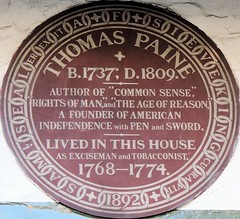
.jpg?width=250)

